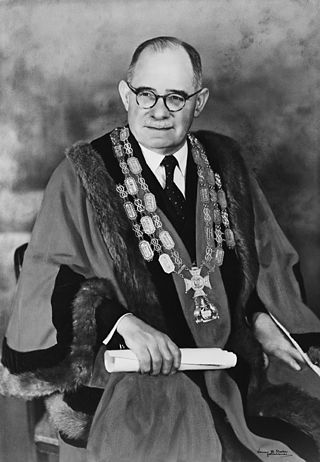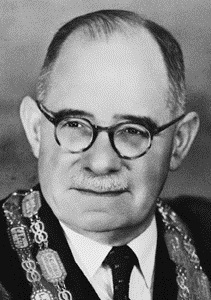
The 1928 New Zealand general election was held on 13 and 14 November in the Māori and European electorates, respectively, to elect 80 MPs to the 23rd session of the New Zealand Parliament.

Norman Vazey Douglas was a New Zealand trade unionist and left-wing politician. He joined the New Zealand Labour Party in 1932, but when John A. Lee was expelled from the party in 1940, Douglas followed to join the new Democratic Labour Party. He rejoined the Labour Party in 1952 and represented the Auckland Central electorate in Parliament from 1960 until his retirement in 1975, serving time on the Opposition front bench.

Mary Manson Dreaver was a New Zealand politician of the Labour Party. She was the third woman to sit in the New Zealand House of Representatives, one of the first two women to sit in the New Zealand Legislative Council, and the only woman to sit in both chambers.

William John Lyon was a New Zealand politician of the Labour Party. He was killed in World War II while serving with the 2nd New Zealand Expeditionary Force.
Waitemata was a New Zealand parliamentary electorate, from 1871 to 1946, and then from 1954 to 1978. It was represented by 18 members of parliament.
Grey Lynn is a former New Zealand parliamentary electorate, in the city of Auckland. It existed from 1902 to 1978, and was represented by nine Members of Parliament.

Sir John Andrew Charles Allum was a New Zealand businessman and engineer, and was Mayor of Auckland City from 1941 to 1953.
Christchurch South was a parliamentary electorate in the city of Christchurch, New Zealand, from 1881 to 1890 and then from 1905 to 1946.

Melville Edwin Lyons, sometimes called Tiny, was briefly a Reform Party Member of Parliament in New Zealand until his election was declared void. A journalist by trade, he became involved in local politics in Christchurch after having served in WWI. He was Deputy Mayor of Christchurch for six years under mayor Ernest Andrews.

The 1943 Christchurch East by-election held on 6 February was caused by the death of Tim Armstrong during the term of the 26th New Zealand Parliament. The by-election in the Christchurch East electorate was contested by five candidates, including representatives from the Labour Party, the Labour breakaway party Democratic Labour Party and the National Party. The election was won by the Labour candidate, Mabel Howard, and started her long parliamentary career, which included her becoming the first female cabinet minister in 1947.

The 26th New Zealand Parliament was a term of the New Zealand Parliament. It was elected at the 1938 general election in October of that year.

The 1945 Dunedin North by-election was a by-election held during the 27th New Zealand Parliament in the Dunedin electorate of Dunedin North. The by-election occurred following the death of MP James W. Munro and was won by Robert Walls.

The Auckland West by-election of 1940 was a by-election for the electorate of Auckland West held on 18 May 1940 during the 26th New Zealand Parliament. The by-election resulted from the death on 27 March 1940 of the previous member Michael Joseph Savage, the revered prime minister whose terminal illness had not been made public.
The Grey Lynn by-election 1963 was a by-election held in the Grey Lynn electorate in Auckland during the term of the 33rd New Zealand Parliament, on 18 May 1963.

The 1936 Manukau by-election was a by-election during the 25th New Zealand Parliament in the Manukau electorate. It was held on Wednesday 30 September 1936. This by-election came about because of the resignation of Bill Jordan upon his appointment to the position of High Commissioner to the UK during the term of the 25th New Zealand Parliament. The by-election in the Manukau electorate was contested by Arthur Osborne for Labour and Frederick Doidge for National, with Osborne winning the election.

The 1945 Hamilton by-election was a by-election held during the 27th New Zealand Parliament in the Waikato electorate of Hamilton. The by-election occurred following the death of MP Frank Findlay and was won by Hilda Ross, both of the National Party.
The Bay of Plenty by-election of 1941 was a by-election for the electorate of Bay of Plenty held on 13 December 1941 during the 26th New Zealand Parliament. The by-election resulted from the death of the previous member Gordon Hultquist of the Labour Party who was killed in World War II.

The 1944 Auckland City mayoral election was part of the New Zealand local elections held that same year. In 1944, elections were held for the Mayor of Auckland plus other local government positions including twenty-one city councillors. The polling was conducted using the standard first-past-the-post electoral method.
The 1942 Hauraki by-election was a by-election for the electorate of Hauraki held during the 26th New Zealand Parliament.

The 1941 Auckland City mayoral election was part of the New Zealand local elections held that same year. In 1941, elections were held for the Mayor of Auckland plus other local government positions including twenty-one city councillors. The polling was conducted using the standard first-past-the-post electoral method.















